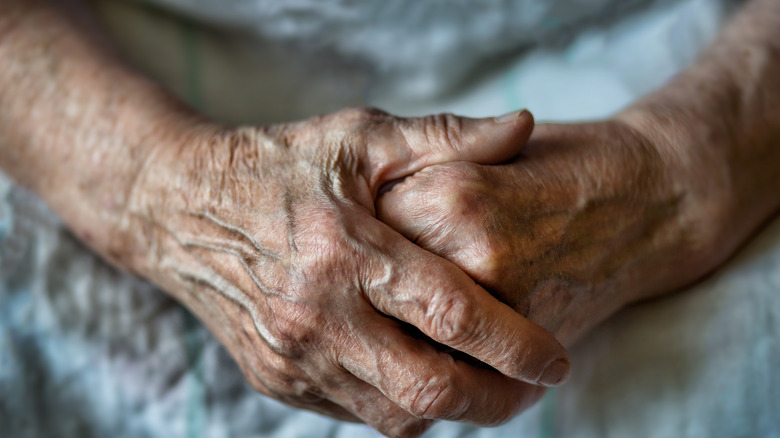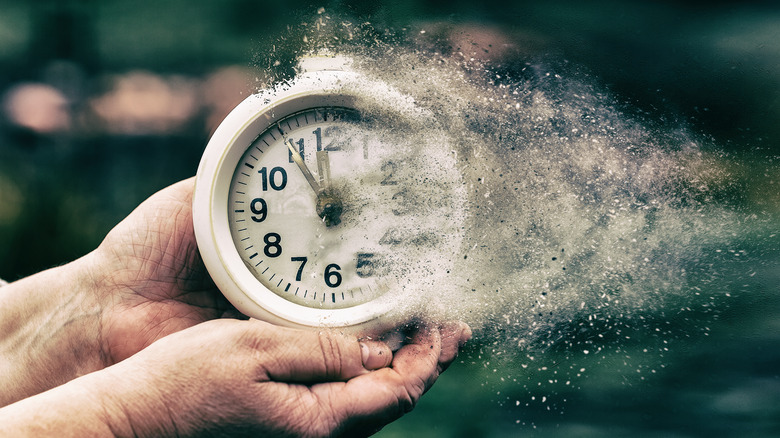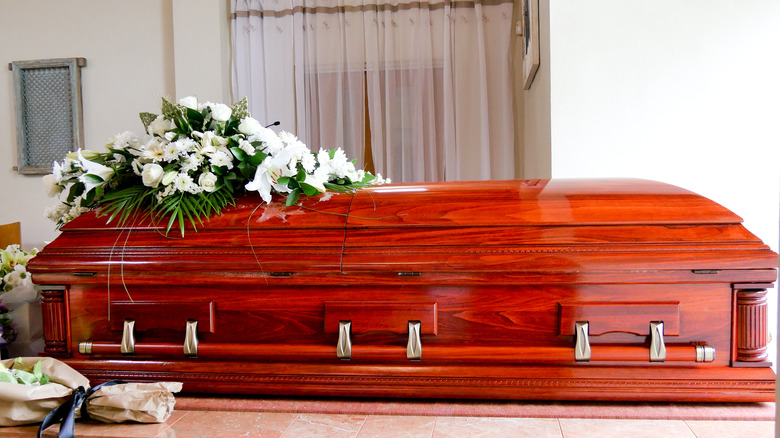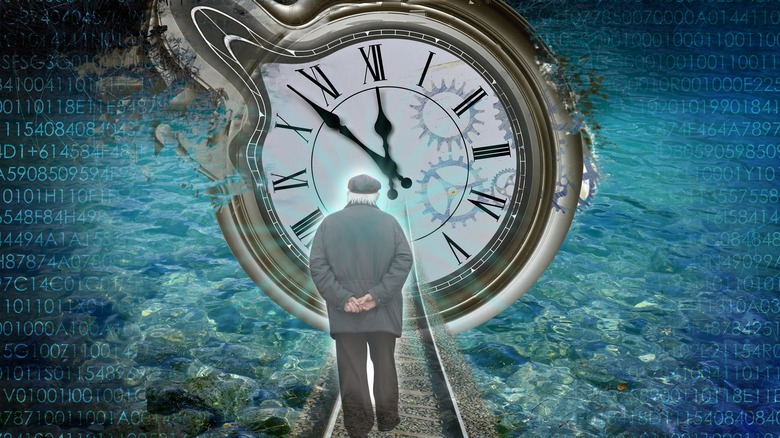Can You Really Die Of Old Age?
A newly released death certificate has revealed that Queen Elizabeth II died of "old age" (via CBS News). This might not come as a surprise to many, as the queen was 96 years old. The Conversation points out that this is an outdated cause of death that provides imprecise information. It was primarily used in the 19th century when an autopsy was unable to be performed or when an individual died from various ailments. However, it lost popularity in the coming decades as it failed to provide mourners with a true reason for their loved ones' death. In simple terms, it did not allow survivors to grieve properly.
Nowadays, it's unlikely that old age will be listed as the cause of death on a death certificate (per Gizmodo). However, ABC Australia notes that the term is still used today as an informal way of describing the death of an older individual. In the queen's case, The Conversation reports that this was written on her death certificate, perhaps out of respect for the royal family. But as Cake explains, old age does not lead to death. Instead, says Dr. Niharika Suchak, the medical director of Big Bend Hospice in Tallahassee, Florida, "A person does not die of old age but many people die at an old age" (via HowStuffWorks).
Old age isn't the only factor
HowStuffWorks reports that in the United States, anyone 65 or older is considered to be elderly. The publication goes on to say that this does not mean that every individual begins to deteriorate at this age; everyone and every body is different. As David Casarett from the Duke University of Medicine puts it, "It's not like as you get older your heart beats more slowly until, finally, late one night, it just doesn't give another squeeze" (via Gizmodo). Insider states that when someone says that a person has died of old age, they're actually referring to an illness or ailment that would likely not kill someone who was younger.
This includes heart attacks and pneumonia (per Cake). For example, Insider writes that when someone dies in their sleep, people may attribute it to old age, but in reality, they had a heart attack. According to Gizmodo, people don't die from old age, but rather from an underlying condition that at times they are unaware of. Michael Rose from the University of California at Irvine explains (via Insider), "Aging is not a relentless process that leads to death." He added, "It's a transitional phase of life between being amazingly healthy, and stabilizing." Although old age may not be a killer, ABC Australia notes that it does increase the chances of suffering from various maladies.
Aging puts you at risk for complications
As the body ages, ABC Australia writes, the immune system and cells become weaker. HowStuffWorks adds that the rate of decline for an individual is dependent on different factors, like genetics and lifestyle. Nonetheless, heart problems and other medical issues are common for the elderly. Dr.Suchak explains, "There is increased occurrence of a variety of chronic conditions with age and these multiple comorbidities increase your risk of mortality. It is not old age by itself that is the culprit." Ultimately, an older body is unable to regulate itself as properly as a younger one, which can cause a slew of problems.
Per Insider, this includes a term known as "geriatric failure to thrive." HowStuffWorks reports that sometimes, it's unknown what directly causes this. However, it can lead to decreased activity, weight loss, decreased appetite, and much more. This, in turn, weakens an older person. According to ABC Australia, old age can also deteriorate the brain. Some may have trouble chewing or swallowing. Other complications to which the elderly are susceptible include cancer and mobility issues. All of these can lead to death.
Even if they are taken to a hospital, their weakened immune systems can cause them to catch something else while getting medical care (per ABC Australia). Gizmodo states that although an individual may maintain their physical and mental health long past their prime, it's inevitable for them to suffer some kind of health issue.
Why do we age?
According to Insider, medical and scientific advancements have successfully prolonged lives, but have not stopped the aging process. ABC Australia states that aging is caused by genes, but the specifics are unknown. The publication adds that researchers believe that cells are involved. They theorize that as we age, our DNA becomes damaged, which hinders the capabilities of cells and tissue to repair. Although scientists hope to one day decipher aging and how to stop it, one thing is clear: Death is inevitable. Jessica Humphrey from the University of California, San Francisco, told Gizmodo that in fact, "But everyone dies the same way: their heart stops. That's the last step."
In regards to people who are older, Cake writes that there are three reasons people die of "old age." This includes the body deteriorating with age, a disease that comes with age, and the inability of cells to renew. Cake goes on to explain the signs involving someone who is elderly and is likely on the brink of death. Most often, the individual will become frail and continue to decline. They will sleep more and eat less. They can also become depressed. Cake notes that many people don't take into consideration that this is being caused by another issue or disease and not old age itself, which only fuels the myth that it causes death.
Dying of old age is subjective
Cake reports that everyone has a different definition of what being "old" is and what it means to die at an old age. For some, it can mean an individual in their 70s, while for someone else, it's someone who is 100. However, this makes a big difference, as either group can have a different definition of how they want to die. Moreover, the publication notes, someone who dies seemingly without any complications is considered to have died of old age. This is why the saying continues to be used in modern society. If someone dies of "old age," it presents to people an image that there was less pain and suffering involved in the transition from life to death.
Furthermore, it's why several people, old or not, say they want to die in their sleep (via Cake). Allen Andrade from the Icahn School of Medicine at Mount Sinai told Gizmodo, "Interestingly, most people do not fear death itself, but rather the process of dying." He went on to say that regardless of how and when someone dies, they "generally experience a similar dying process." With that being said, Dr. Suchak explained to HowStuffWorks why old age is not a cause of death that will be seen on a death certificate. She said, "Often, the immediate cause or physiologic process for death is cardiopulmonary arrest which occurs due to an underlying condition (often acute) such as severe heart attack, uncontrolled infection, progression of cancer, severe stroke, large pulmonary embolism, etc."
Dying of old age can be seen as symbolic
Cake states that many older individuals have come to terms with their impending death. An article from the Journal of the Royal Society of Medicine (JRSM) explains that for the elderly, the process of dying is longer than for younger people. There's often a slow decline and the individual is well-aware that they will die soon. While many may become angry and confused, others are accepting. Per HowStuffWorks, Dr. Suchak explains further. She said, "There may be less of a struggle 'to live' and fewer last-minute, rushed efforts in the form of aggressive treatments. They may have made their peace and are ready to move on to the next phase in the cycle of life and death."
Gizmodo reports that David Casarett echoed this sentiment and saw that same behavior in his palliative care patients. He noted, "And that's maybe the biggest difference between people who die at a very advanced age and the rest of these. Many who die in their 90s or beyond have made their peace with death. They've done what they need to do and said what they need to say. Maybe they've been ready for years." Casarett added, "If 'dying of old age' means anything at all, it's that willingness to say goodbye and move on."





